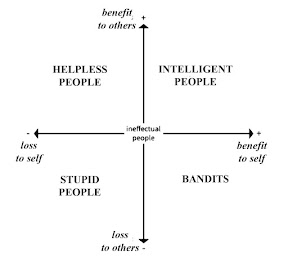 By
Madeleine Kando
By
Madeleine Kando
You cannot call someone stupid these days, or you could be arrested for political incorrectness. There are other alternatives, like calling someone an airhead, a bird brain, or a dumbass, but that might land you on the floor with a bloody nose.
Thanks to the incredible richness of the American language, however, there are safer ways to describe a stupid person (preferably without them being present): ‘He’s one fry short of a happy meal. ‘The light is on, but nobody’s home. ‘As bright as Alaska in December. ‘Goes surfing in Nebraska. ‘His belt doesn't go through all the loops. ‘His cheese has slipped off his cracker.’
Humor goes a long way, but it doesn’t change the fact that of all our human qualities, stupidity is the most abundant.
What is stupidity? Wikipedia’s definition is: ‘Stupidity is a lack of intelligence, understanding, reason, or wit. It may be innate, assumed or reactive’. Does that really explain why the world is full of stupid people and why non-stupid people do so many stupid things?
I was lucky enough (not smart enough) to come across an essay called: "The Basic Laws of Human Stupidity", written by Carlo Maria Cipolla, an Italian economic historian. This is what he has to say about stupidity:
THE FIRST BASIC LAW: Everyone always and inevitably underestimates the number of stupid individuals in circulation.
THE SECOND BASIC LAW: The probability that a certain person will be stupid is independent of any other characteristic of that person.*
THE THIRD BASIC LAW (The Golden Rule): A stupid person is a person who causes losses to others while deriving no gain to self and even possibly incurring losses.
Human beings fall into four basic categories: the Helpless, the Intelligent, the Bandit and the Stupid (See figure 1). If you suffer a loss while producing a gain to someone else, you are in field H: You act helplessly. If you make a gain while also creating a gain to others, you in area I: You act intelligently. If you gain something, but cause someone else a loss, you are in area B: you act as a bandit. If you do something that harms others and yourself, you fit in area S. You act stupidly.
Rational people have difficulty understanding irrational behavior. We can deal with a devious person’s motivation, or avoid being played for a patsy, but because you have to be smart enough to recognize how stupid you are, a stupid person will never realize that they are stupid. They will overestimate their own competence, knowledge etc.
It’s called the The Dunning-Kruger effect. Unfortunately, it also causes those who know what they are talking about, to underestimate their own intelligence. They assume that everybody else knows what they know, since it is so easy for them to be smart, which confirms the first law of stupidity. ‘Everyone always and inevitably underestimates the number of stupid individuals in circulation.’
In table 2, you notice that each square is divided into two. I am a notorious binge watcher of mediocre movies, which seriously cuts into my beauty sleep time. That puts me squarely in the S category. But am I also a victim of Netflix pulling on my addiction strings? Regardless, my action ends up being a loss to self. Likewise, area B contains both smart thieves, who cause gain to self to match the loss to others and stupid thieves whose actions cause more loss to others than gains to themselves. A head of state who causes vast destruction and mass murder in return for the illusion that he is protecting the ‘fatherland’ is a stupid bandit.
THE FOURTH BASIC LAW: Non-stupid people always underestimate the damaging power of stupid individuals.
THE FIFTH BASIC LAW A stupid person is more dangerous than a bandit.
If all bandits were perfect bandits, there would be a back and forth between loss to others and gain to self, depending on whose turn it is to be the bandit. It would not change the overall make up of society. But if stupid people are in power, they cause a loss to others with no gain to themselves. Everybody loses. Society as a whole goes down the drain, as shown by the pink area in table 3.
In a previous post, I wrote about Dietrich Bonheoffer, a staunch critic of the Nazi regime. He was put in jail and eventually executed. While in prison, he wrote Letters and Papers from Prison and said: “Stupidity is a more dangerous enemy of the good than evil”.
Contrary to Cipolla, Bonhoeffer doesn’t believe people are born stupid. We become stupid under certain circumstances. He believed that stupidity is a moral problem, above all.
In The Triumph of Stupidity, (1935) Bertrand Russel said: 'The fundamental cause of our trouble is that in the modern world the stupid are cocksure while the intelligent are full of doubt.’











